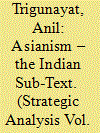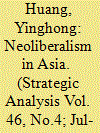|
|
|
Sort Order |
|
|
|
Items / Page
|
|
|
|
|
|
|
| Srl | Item |
| 1 |
ID:
187756


|
|
|
|
|
| Summary/Abstract |
Going by the economic growth patterns of China, India, Japan, South Korea and ASEAN countries with corresponding decline in the Western economic heft, it was often claimed that the 21st century will be the Asian Century. This might be in doubt due to the pandemic and geopolitical contestation between China and the US, where new faultlines are being drawn. Moreover, India and China being in a potential conflict zone, the dream of the Asian Century might have receded even further. But Asianism, given its intrinsic strength, has gone through its own evolution over the centuries, as the major Asian civilizations and cultures have interacted often seamlessly and occasionally competed with one another. Assimilation has often been the result. Ancient is intrinsic to the Asian thought, philosophy, and existence. Harmony with nature and a share-and-care attitude have been the hallmarks of the quest for eternal peace and co-existence. Yet, political Asianism has occasionally witnessed conflicts and wars in the name of supremacy and superiority which was hardly the real essence of the Asiatic value systems. The battle between the West and East accentuated them through the 19th and 20th centuries and the First and Second World Wars. The Western system moved forward, as Japan was defeated but eventually became part of the Western alliance system. India became independent and avoided the Cold War with the global governance architecture by virtue of her ancient mystical heritage and knowledge, new-found democratic credentials, a moral and principled stance reflected through her non-aligned approaches and pragmatic emphasis on peace and development for one-sixth of humanity, thereby leading the newly-independent developing countries from Asia to Africa, from the clutches of colonialism. This has provided India with an authoritative international voice of reason. And this is what will combine her software, powered by the civilizational heritage and universality of her cultural ethos, to enhance and extend her soft power appeal which is the subtext of her very existence.
|
|
|
|
|
|
|
|
|
|
|
|
|
|
|
|
| 2 |
ID:
187753


|
|
|
|
|
| Summary/Abstract |
In this article, I seek to understand the pre-European diversity of Asia as a recoverable ideal for a new Asianism, one that takes cosmopolitanism, plurality, and the concrete presence of the Other seriously, as modes of ‘reimperializing’ Asia based on Asian traditions of moral and cultural imagination. This pre-European diversity, rooted in the relational, inter-communal, and unfolding identity of the human person, is a new way of seeing Asia as ‘one’—the one, dynamic self, unbounded by nationalist or ideological constraints, on which a re-formation of social and political arrangements can and must be predicated.
|
|
|
|
|
|
|
|
|
|
|
|
|
|
|
|
| 3 |
ID:
187754


|
|
|
|
|
| Summary/Abstract |
The complexity of connectivity is reflected in the migrant’s socialization process. Whilst the socialization process in transnational spaces often leads to further ethnic divisiveness, Japanese migrants who had opportunities to encounter Asian Others gradually embraced an overarching Asian identity in Dublin. The shared liminal status of migrants in the local society contributed to the forging of an emotional pan-Asian solidarity and acted as a form of migrant identity against hegemonic whiteness. By ethnographically examining the identity construction patterns of Japanese migrants in Dublin, this article aims to unfold how the idea of Asianism plays out in the shifting racial dynamics.
|
|
|
|
|
|
|
|
|
|
|
|
|
|
|
|
| 4 |
ID:
187752


|
|
|
| 5 |
ID:
187758


|
|
|
|
|
| Summary/Abstract |
Through the lens of land acquisition by the State for development in India and China, an extensively and compulsorily strong State intervention has been witnessed. It pushes forward asymmetric neoliberal reforms, draws value surpluses from land development, and frequently uses mandatory coercive measures, when necessary, to accelerate the economic development process. The current reform has not substantially revised, but in fact, has sustained this model of development. It is a combination of a developmental State in the neoliberal era along with a well-controlled market mechanism, which constitutes the basic features of Asian neoliberalism and distinguishes itself from its Western counterparts.
|
|
|
|
|
|
|
|
|
|
|
|
|
|
|
|
| 6 |
ID:
187755


|
|
|
|
|
| Summary/Abstract |
Discussion on Asia and Asian values is conspicuously absent from existing research in global capitalist society. In order to foster critical debates on ‘Asianism Retold’, we explore how Asian traditional value has been integrated into the contemporary business system. By examining Japan’s traditional values—Sanpo-yoshi, this article explores the relationship between corporate social responsibility (CSR) and Asian values. The case study also shows how the management strategy of Japanese companies applies Sanpo-yoshi to demonstrate typical CSR in certain ways and influence people’s views on responsible and ethical business. Implications of this research for both researchers and practitioners are discussed in the conclusion.
|
|
|
|
|
|
|
|
|
|
|
|
|
|
|
|
| 7 |
ID:
187757


|
|
|
|
|
| Summary/Abstract |
Thailand has been at the core of the Asian Values debate since the 1992 World Conference on Human Rights. Sufficiency Economy Philosophy (SEP) is a concept developed by the late King Bhumibol Adulyadej to consolidate his approach to governance and development. Integrating values borrowed from Theravada Buddhism such as benevolence, emphasis on the middle way and on the public good. This article explores the development of SEP focussing on the role of values and leadership styles. SEP provides evidence of an Asian value-oriented inclusive leadership style, which is practiced in both the private and the public sectors. A model of SEP as a management style is presented and subjected to critical analysis.
|
|
|
|
|
|
|
|
|
|
|
|
|
|
|
|
|
|
|
|
|